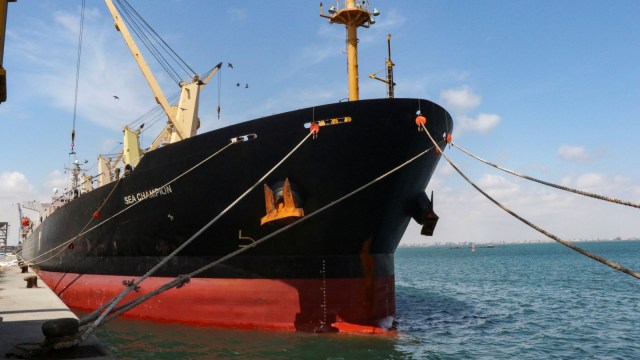
The simmering tensions in the Red Sea, fuelled by the unabated Houthi attacks on maritime traffic, have sparked international concern. The attacks have not disrupted global oil trade and pushed up oil prices. Beyond the immediate economic impact, which is significant, there are potential and intriguing geopolitical implications. With China’s growing presence in the region and its leverage over important players like Tehran, Beijing might see the Red Sea crisis as an opportunity to expand its influence in the Middle East, thereby potentially challenging the US’s long-held dominance over the region. However, overplaying its hand in the crisis can also severely undermine China’s economic well-being and its geopolitical ambitions.
The Houthis’ attacks have led shipping companies to reroute their vessels from the Red Sea, sending them around Africa through the Cape of Good Hope — a much longer, costlier, and less efficient passage. As one of the world’s biggest exporters and a major oil importer, China has a vested interest in the stability of the Red Sea region. With a large chunk of its trade using the Red Sea route, disruptions due to Houthi attacks can potentially raise shipping costs, complicate access to crucial resources, and threaten China’s economic well-being. Additionally, the Suez Canal, a key trade route for China-EU commerce, becomes less viable with heightened security concerns. However, this vulnerability also presents an opportunity.
Over the last two decades, China has been expanding its footprint in the Middle East. The Beijing-brokered Saudi-Iran deal last year further established China as a significant player in the region. The optics of China playing an effective mediatory role between long-time adversaries was seen as the beginning of a power shift, with Beijing replacing Washington as a more reliable mediator.
Both the US and UK have urged China to press Iran to rein in Houthi attacks in the region, a clear recognition of Beijing’s influence in the region. China has nurtured closer ties with Iran as a counterweight to US influence in the region. By actively mediating a solution to the Red Sea crisis, China could project itself as a responsible global power, garnering trust and influence in the region. This could potentially eclipse US efforts, presenting China as a viable alternative to American leadership.
Moreover, the Israel-Hamas war and the Red Sea crisis have served as a strategic distraction for Washington, diverting its attention away from the Indo-Pacific. This distraction has facilitated China’s own geopolitical manoeuvres in the South China Sea. China has stepped up its military intimidation of Taiwan and the Philippines since November 2023. The more the US and EU are consumed by the Middle East crises, the more opportunity China will get to increase its dominance in the Indo-Pacific.
Though Houthi attacks have severely disrupted Chinese trade and made this route vulnerable for Chinese maritime vessels, Beijing has avoided direct military involvement or condemnation of Houthis, unlike the US and UK. Washington and London have been carrying out strikes at Houthi targets in Yemen in retaliation to attacks on Western commercial ships in the wake of the Hamas war. The US retaliatory strikes were condemned by important stakeholders, including Turkey and Russia, both of whom highlighted Israel’s attack on Gaza as the root cause of the escalation in the Red Sea. In such an environment, the Chinese neutrality seems strategic. It allows China to maintain good relations with Iran, a potential mediator while avoiding being seen as aligning with the West in support of Israel.
Besides, China has adopted a cautious approach to the ongoing Israel-Palestine conflict. By criticising Israel’s action in Gaza and lending outward support to South Africa’s landmark case against Israel in the International Court of Justice, China has aligned itself with Arab sentiments. China’s advocacy for a Palestinian state has widened space and avenues for its influence in the region. Such a stance would further strengthen China’s already significant economic ties with Arab states and Iran.
However, China needs to be cautious of overplaying its hand in the Red Sea crisis. Despite Chinese pressure on Tehran to reign in the Houthis, the Yemeni group has refused to back down or de-escalate its attacks in the region. This indicates two things, both of which don’t augur well for China’s influence in the region. First, it may signal China’s limited influence over Iran, and second, it potentially exposes Tehran’s inability to control Houthis. Pressuring Tehran might not, therefore, guarantee a change in Houthi actions. The unabated Houthi attacks would thus equally compromise China’s economic interest in the region and beyond.
The failure of China on this diplomatic front may severely dent its image and credibility as a major player in the region. While the US, with its robust power projection capabilities, can intervene militarily against the Houthis at will, China’s military presence in the region is limited. Though China has a base in Djibouti, its ability to intervene effectively is still questionable. As a result, China is forced to rely on diplomacy or partnerships, and failures on the diplomatic front can potentially expose its limited influence and undermine its strategic calculus. Moreover, the complex dynamic of the Middle East can easily derail China’s balancing act. China’s overreach of the Palestinian cause will further sour its relations with Israel which is a key trading partner.
The Red Sea crisis, thus presents a complex opportunity for China. While the strategic potential to expand its influence in the Middle East and reliably undermine US dominance is undeniable, significant challenges remain. China’s overreliance on diplomacy seems unlikely to deliver. With a limited military presence, it will be difficult for China to effectively intervene and safeguard its economic interests in the region, should the Houthi attacks continue.
The writer is a senior IPS officer and PhD scholar from Princeton University